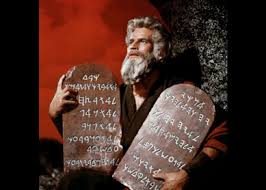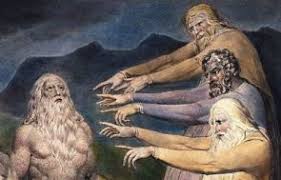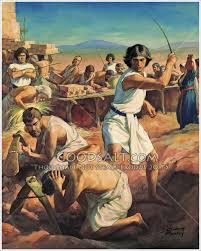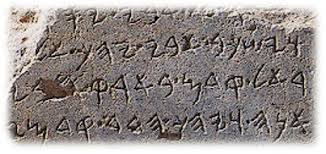The last paragraph of Part 1 stated, “The God and Creator of the universe did not leave man to wander about blindly and aimlessly. He gave his people a way to gain and keep knowledge, not only about who God was, but also how to live their lives with one another (i.e. The Ten Commandments). In the next segment we will look at how God used the written word to encourage his people, to help them cope with the times when bad things were happening to His people.” There are Old Testament references about God’s use of writing for both recording His direct help and for providing comfort to His people.

The first Biblical comment in Exodus regarding the use of writing goes back to Exodus 17:14 (All Biblical references will be from the New American Standard Bible); Then the Lord said to Moses, “Write this in a book as a memorial and recite it to Joshua, that I will utterly blot out the memory of Amalek from under heaven.” Here we see that God wants His Divine Intervention to be written for posterity. Another point to make note of is that this verse comes before God wrote the Ten Commandments on Mount Sinai. This further illustrates that the Israelites were writing before that event. But there is more.
Knowing that God desires to communicate with his people; knowing He wants a record kept of His interactions; one understands the importance of the written word. Scholars today recognize and acknowledge that the book of Job was the first written book of the Bible. If one believes what Exodus itself states about the early use of writing, then the conclusion would be that Job was written sometime before the Exodus event because it occurred before God’s people entered the Promised Land.

As such the purpose for writing the book of Job should be viewed as a way to encourage the Israelite slaves to persevere through their captivity in Egypt. One can read of this purpose in Job 19:23 when Job himself states, “Oh that my words were written! Oh that they were inscribed in a book!” Now note, during that same time frame, that Israelite slave in the Sinai Peninsula is chiseling and inscribing his prayer to God. What makes this significant is that the very next verse Job 19:24 goes on to say, “That with an iron stylus and lead, they were engraved in the rock forever!” This makes for some credible, even if only circumstantial evidence.
Furthermore it makes perfect sense. When one reads Job, look at all the bad things that happened to him. Look at how Job’s “friends” tried to reason out why these bad things happened to him. Look at how Job refused to be swayed by his friends but instead knew that God must have had a purpose even though Job himself didn’t understand what that plan and purpose was.

The amazing evidence is that the Egyptian slaves, through the writings of Job, knew there was a purpose for their predicament. By carefully reading the 19th chapter of Job it becomes clear that those slaves were seeing a written expression of the events of their lives in captivity and eventual rescue as seen in Exodus. The chapter ends with Job expressing his steadfastness to his Redeemer, knowing someday he, Job, would be with his God. When viewed through this lens Job 19:7-29 appears almost prophetic to those Israelite slaves in Egypt:
Everything Is against Him
7 Behold, I cry,
‘Violence!’ but I get no answer; I shout for help, but there is no justice.
8 He has walled up my way so that I cannot pass, and
He has put darkness on my paths.
9 He has stripped my honor from me and removed
the crown from my head.
10 He breaks me down on every side, and I am gone;
and He has uprooted my hope like a tree.
11 He has also kindled His anger against me and considered
me as His enemy.
12 His troops come together, and build up
their way against me and camp around my tent. 13 He
has removed my brothers far from me, and my acquaintances are
completely estranged from me.
14 My relatives have failed, and my intimate
friends have forgotten me.
15 Those who live in my house and my maids consider me a
stranger. I am a foreigner in their sight.
16 I call to my servant, but he does not answer; I have
to implore him with my mouth.
17 My breath is offensive to my wife, and I am
loathsome to my own brothers.
18 Even young children despise me; I rise up and they
speak against me.
19 All my associates abhor me, and those I
love have turned against me.
20 My bone clings to my skin and my flesh, and I
have escaped only by the skin of my teeth.
21 Pity me, pity me, O you my friends, for the hand
of God has struck me.
22 Why do you persecute me as God does,
and are not satisfied with my flesh?
Job Says, “My Redeemer Lives”
23 Oh that my words were
written! Oh that they were inscribed in a book!
24 That with an iron stylus and lead they were engraved
in the rock forever!
25 As for me, I know that my Redeemer lives, and at
the last He will take His stand on theearth.
26 Even after my skin is destroyed, yet from my
flesh I shall see God;
27 Whom I myself shall behold, and whom my eyes
will see and not another. My heart faints within me!
28 If you say, ‘How shall we persecute him?’ And
‘What pretext for a case against him can we find?’
29 Then be afraid of the sword for yourselves,
for wrath brings the punishment of the sword,
So that you may know there is
judgment.”
So what we have is an Egyptian slave, an Israelite, familiar with the writings of Job being forced into a mine, digging for turquoise. Day after back breaking day he endures this enslavement; finally, crying out for aid he chisels out his prayer. This slave, just like Job, doesn’t understand why he and his people, the people of God, are suffering the way they are, but He doesn’t give up to despair. He wants to be saved, surely, but God has His purposes too. So this slave prays a prayer of supplication, “EL( Hebraic for God), remember me.” Some think the writing may be saying, “EL, save/rescue me.” Regardless of how one interprets the prayer, the book of Job would have given hope and encouragement to those Israelite slaves helping them persevere and endure those hardships until the time God delivers them out of Egypt.

God ultimately does remember rescues the Israelite slaves. Reflect on the entirety of this whole monumental set of events. The Israelite slaves, having read Job endured extreme hardships actually were witnesses of the purposes and power of God. They experienced His miracles firsthand. They saw the 10 plagues that fell upon their captors. They saw the parting of the Red Sea that fell upon their captors’ chariots. After being delivered from bondage they witnessed the making of a covenant with God and the writing of the Ten Commandments. These ex slaves then returned to the Promised Land, a land where God would abide with His people; God’s Kingdom land.

One can certainly see the importance of the written alphabetic language and the original purpose for the book of Job. Here is direct written evidence that God found a way to encourage His people. God directly helped them persevere through times when extremely bad things were happening. This was first time God provided written words of encouragement and ultimately restoring His People and His Kingdom; although it’s not the only time.
🙂 Thanks. It is interesting that the first alphabet was likely semitic.
What’s more, there is a new archaeological find that comes right from an Egyptian tomb, which reinforces the semitic alphabet and the early dates. Stay tuned as I am working on this development right now.